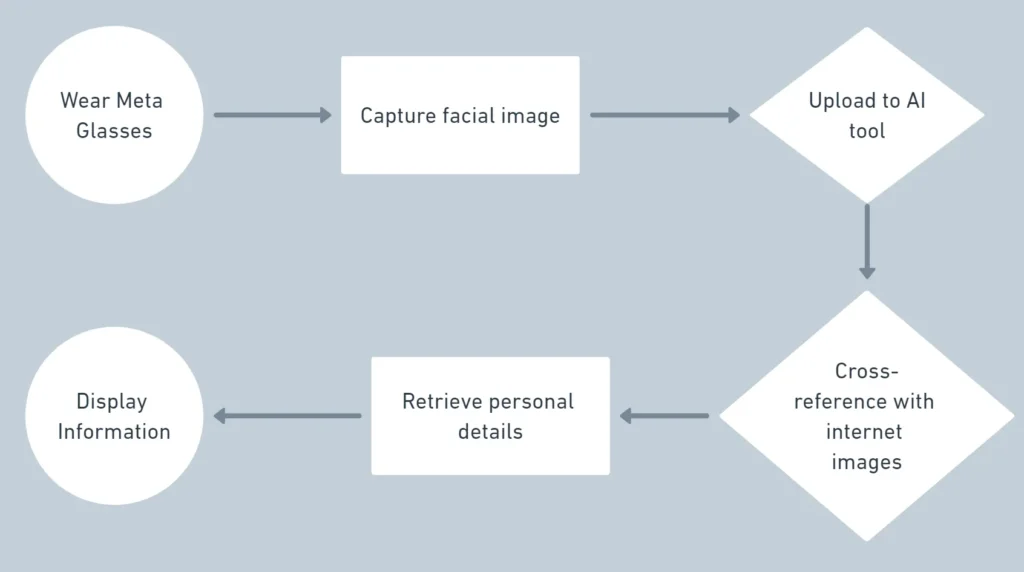Harvard students have developed a program that changes how we think about privacy. Using Meta smart glasses, this program identifies people and retrieves their personal details instantly. A single look can now uncover someone’s name, address, and phone number.
The program works by pairing Meta glasses with facial recognition tools, like PimEyes. The technology scans faces in public and cross-references public databases for matching information. What used to take hours is now completed in just seconds.
While the development is surely exciting, it raises serious concerns about the potential misuse of such technology in everyday settings.
How Do Meta Glasses Work to Reveal Information?

When the Meta glasses record a person’s face, the footage is uploaded to an AI-driven tool created by the Harvard students. This tool cross-references the face with publicly available images across the internet, identifying matches quickly.
The process doesn’t stop with facial identification alone. Once a match is found, another AI system retrieves personal details from various public databases. Information such as names, addresses, and even phone numbers are gathered and displayed within seconds.
This method of gathering personal data is concerningly fast and accessible. By using publicly available data sources, the technology performs instant background checks. It raises privacy concerns, as any stranger can access sensitive information easily.
Why Harvard Students Developed This Technology?
The motivation behind this project was to raise awareness of growing privacy concerns. The two Harvard students wanted to show how easily personal details can be accessed. By using everyday tech, they hoped to make people more conscious of their online presence.
Their goal wasn’t to create a dangerous tool but to highlight serious privacy risks. They tested the Meta glasses to prove how real the threat is today. This experiment was a wake-up call for anyone concerned about data safety.
By refusing to release the program, they showed responsibility and caution. Instead, they provided guidance on how people can protect themselves from these risks. Their project leads to conversations about the need for stronger privacy protection in the future.
How Dangerous is This Technology?
This technology poses a real threat to personal safety. With Meta smart glasses, strangers can access private information instantly. This includes names, addresses, and phone numbers, creating a serious risk for stalking.
Another concern is identity fraud. Criminals could use this technology to gather sensitive details for fraudulent activities. Personal information being available in seconds makes unsuspecting individuals vulnerable to scams.
Public spaces no longer feel secure with this technology in use. The ability to gather personal data from a glance could lead to dangerous interactions. The ease of access raises questions about privacy in everyday life.
How Can You Protect Yourself?
Protecting yourself starts with taking control of your personal data online. Begin by opting out of people-search databases like PimEyes and others that collect public information. This reduces the chances of your personal details being accessible to anyone having technology such as the Meta glasses.
Removing your data from online platforms is crucial. Many sites allow you to request the deletion of your personal information through simple forms. By doing this, you limit the sources that invasive tools can access to gather information about you.
Staying vigilant is also essential as new databases may surface. Regularly check for any new platforms that may store your details and opt out again. This ensures that your privacy remains guarded even as technology advances.
The Future of Privacy and Technology
Future implications for privacy are becoming a serious concern. As wearable technology advances, personal privacy could face more challenges. The ability to instantly access someone’s details may lead to new threats.
Laws protecting privacy might need stronger measures. Current regulations struggle to address the rapid pace of technological growth. Wearable tech like Meta glasses brings pressing questions about rights in public spaces.
Raising awareness is essential to counter the risks. Public conversations about privacy will likely shape future technology policies. Balancing innovation with safety could become a central focus in upcoming discussions.
